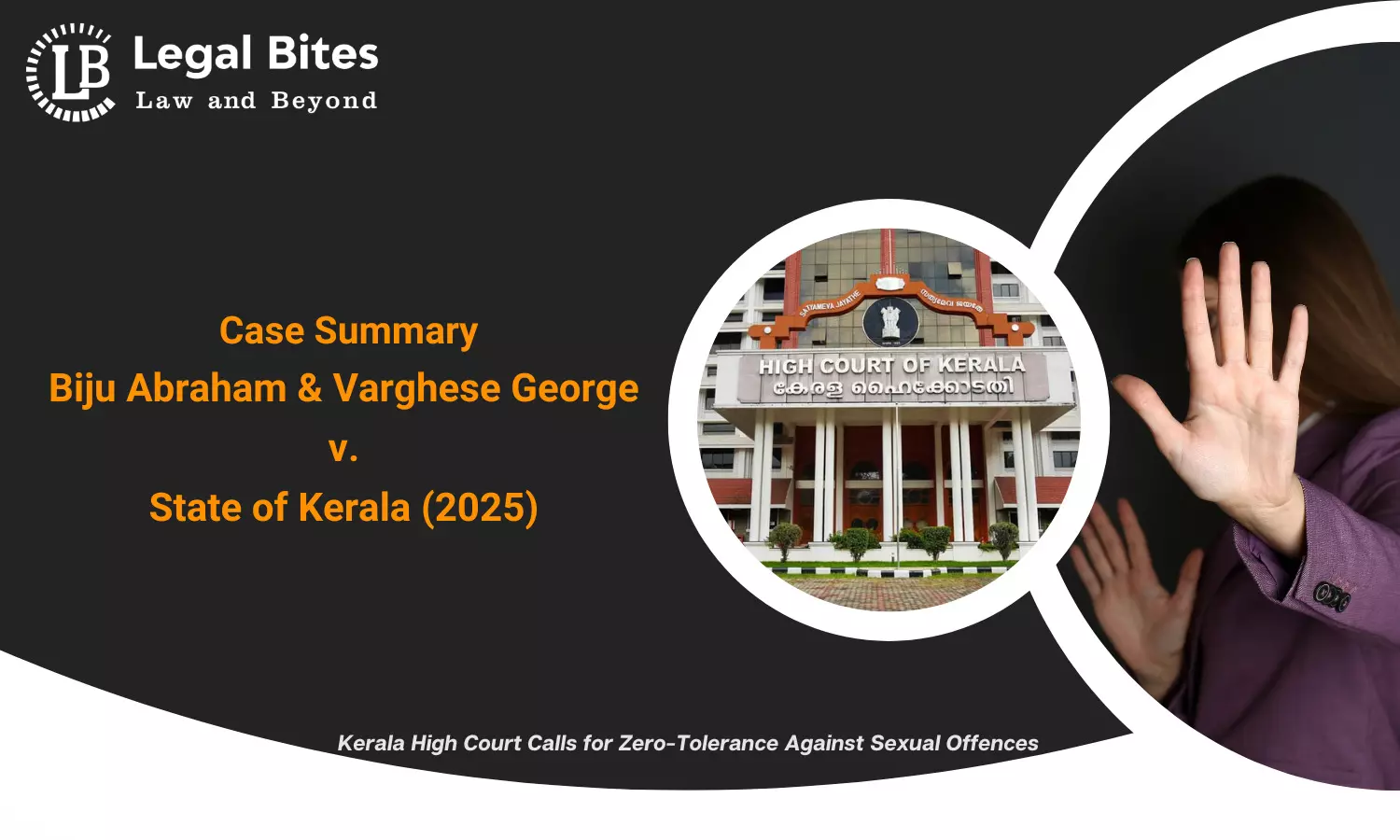Case Summary: Biju Abraham & Varghese George v. State of Kerala (2025) | Kerala High Court Emphasizes Zero-Tolerance for Sexual Offences
Kerala High Court affirms the conviction of two for outraging a woman's modesty under Section 354 IPC, highlighting the victim's credible testimony.

The case revolves around a criminal revision petition filed by the accused, Biju Abraham and Varghese George, who were convicted under Section 354 read with Section 34 of the Indian Penal Code (IPC) for outraging the modesty of a woman. The petition challenges the concurrent findings of the Judicial First Class Magistrate Court-I, Pathanamthitta, and the Additional Sessions Court-II, Pathanamthitta.Title: Biju Abraham & Varghese George v. State of KeralaCourt: High Court of Kerala...
The case revolves around a criminal revision petition filed by the accused, Biju Abraham and Varghese George, who were convicted under Section 354 read with Section 34 of the Indian Penal Code (IPC) for outraging the modesty of a woman. The petition challenges the concurrent findings of the Judicial First Class Magistrate Court-I, Pathanamthitta, and the Additional Sessions Court-II, Pathanamthitta.
Title: Biju Abraham & Varghese George v. State of Kerala
Court: High Court of Kerala at Ernakulam
Citation: Crl. Rev. Pet. No. 1196 of 2024
Coram: Honourable Justice A. Badharudeen
Date of Judgment: January 29, 2025
Factual Background
On September 18, 2011, around 8:00 p.m., the de facto complainant was travelling with her child in an autorickshaw on the Nellikala-Vattakavu public road. Accused Nos. 1 and 2, Biju Abraham and Varghese George entered the autorickshaw en route. During the journey, Biju Abraham allegedly pressed the complainant's left breast while Varghese George grabbed her belly, thereby outraging her modesty.
Following the incident, a crime was registered under Section 354 read with Section 34 IPC at the Aranmula Police Station. After completing the investigation, the police filed a charge sheet against the accused.
Trial Court Proceedings:
The Judicial First Class Magistrate Court-I, Pathanamthitta, took cognizance of the case and conducted a trial. The prosecution examined seven witnesses (PWs 1 to 7) and marked documents (Exts. P1 to P7). The de facto complainant (PW1) and her mother (PW4) provided key testimonies, while PW2 (autorickshaw driver), PW3 (neighbour), and PW6 (the complainant's husband) turned hostile.
The accused were examined under Section 313 of the Code of Criminal Procedure (CrPC) to address incriminating evidence, which they denied. Despite being given the opportunity, the accused did not present any defence evidence.
Relying on the testimonies of PW1 and PW4, the trial court found the accused guilty under Section 354 r/w Section 34 IPC. Considering the pre-amendment provision of Section 354 IPC (prior to the Criminal Law Amendment Act, 2013), which prescribed a maximum punishment of two years imprisonment or a fine or both, the court sentenced the accused to six months of rigorous imprisonment.
Appellate Court Proceedings:
The accused challenged their conviction and sentence before the Additional Sessions Court-II, Pathanamthitta, through Criminal Appeal No. 11 of 2023. The appellate court, after thoroughly examining the evidence and legal arguments, upheld the trial court's findings, affirming both the conviction and the sentence.
Revision Petition
Dissatisfied with the concurrent findings, the accused approached the Kerala High Court through a criminal revision petition, challenging the legality, propriety, and correctness of the lower courts' judgments.
Arguments Presented:
For the Petitioners (Accused):
The defence counsel argued that there were contradictions in the testimonies of PW1 and PW4, which were not adequately considered by the trial and appellate courts. It was contended that PW1's testimony included statements beyond her initial complaint, while PW4 was not an eyewitness but relied on hearsay. The defence highlighted that key witnesses (PW2, PW3, and PW6) turned hostile, undermining the prosecution's case. Reliance was placed on the Supreme Court's judgment in Vijay Kumar v. State of Rajasthan [2014 (1) KLD 560 (SC)] to assert that the prosecution's case was based on fabricated evidence.
For the Respondent (State of Kerala):
The Senior Public Prosecutor supported the findings of the lower courts, emphasizing that the evidence of PW1, corroborated by PW4, was consistent and credible. The prosecution argued that minor contradictions or omissions did not undermine the core of the prosecution's case. The prosecutor also opposed any reduction in the sentence, considering the gravity of the offence.
Court's Observations and Findings
Justice A. Badharudeen, while delivering the judgment, made the following observations:
- Scope of Revisional Jurisdiction: The court reiterated that its revisional powers are limited to addressing legal errors, jurisdictional issues, or perversity in the findings of the lower courts. It is not an appellate forum to re-evaluate the entire evidence unless there is a glaring miscarriage of justice.
- Reliability of Prosecution Witnesses: The court noted that PW1, the victim, provided a consistent and detailed account of the incident, which remained unshaken during cross-examination. Her testimony was corroborated by PW4, who heard the victim's distress over a phone call and took immediate action.
- Hostile Witnesses: The court observed that the hostility of prosecution witnesses (PW2, PW3, and PW6) did not automatically discredit the prosecution's case. The testimony of a single, reliable witness can be sufficient for conviction if it inspires confidence.
- Contradictions and Omissions: The court held that minor discrepancies or omissions in testimonies are natural, especially considering the delay between the incident and the trial. Such inconsistencies do not necessarily render the entire prosecution case unreliable. The court referred to Balu Sudam Khalde v. State of Maharashtra (AIR 2023 SC 1736), emphasizing that minor variations should not lead to the wholesale rejection of credible evidence.
- Assessment of Modesty: The court highlighted the importance of protecting women's dignity and modesty, noting that outraging a woman's modesty extends beyond physical acts and includes any conduct intended to insult her modesty. The court stressed the societal obligation to adopt a zero-tolerance approach toward offences against women.
Conclusion
The court concluded that the prosecution had successfully established the accused's guilt beyond reasonable doubt. The trial and appellate courts had correctly appreciated the evidence and arrived at a just conclusion.
Modification of Sentence:
While affirming the conviction, the High Court slightly modified the sentence, reducing it from six months to five months of rigorous imprisonment, considering the long pendency of the case and the fact that the offence occurred before the amendment of Section 354 IPC in 2013.
Final Order:
- The revision petition was allowed in part.
- The conviction of the accused under Section 354 r/w Section 34 IPC was upheld.
- The sentence was modified to five months of rigorous imprisonment.
- The interim stay on the execution of the sentence was vacated, with a direction for the accused to surrender before the trial court within two weeks to serve the sentence.
Key Takeaways:
- Testimonies of the victim and corroborating witnesses can form the basis of conviction even if some witnesses turn hostile.
- Minor contradictions or omissions in testimonies do not undermine the prosecution's case if the core facts are consistent and credible.
- Revisional courts have limited powers and cannot re-evaluate evidence unless there is a manifest error or miscarriage of justice.
- Protection of women's dignity is paramount, and courts must adopt a sensitive approach while dealing with cases involving offences against women.
Click Here to Read the Official Judgment
Important Link

Ananya Gupta
Ananya is an alumnus of the prestigious Government Law College, Mumbai, specializing in Corporate Law. A passionate legal scholar, she is deeply involved in research, focusing on corporate governance and regulatory frameworks.

